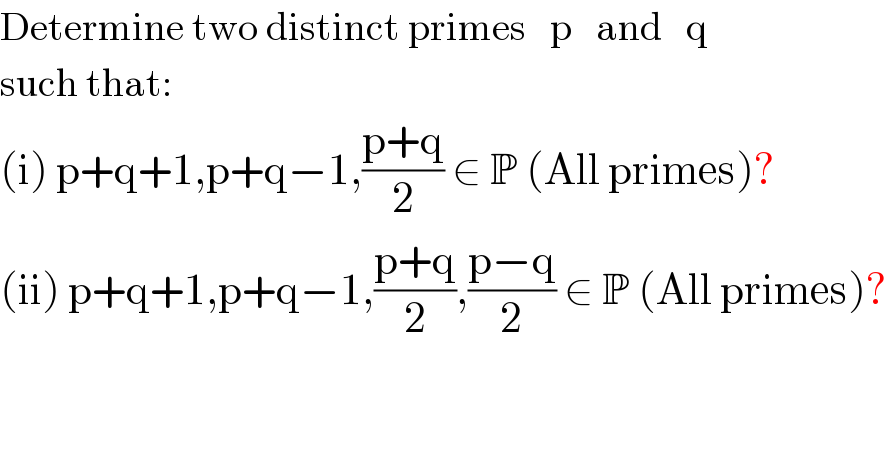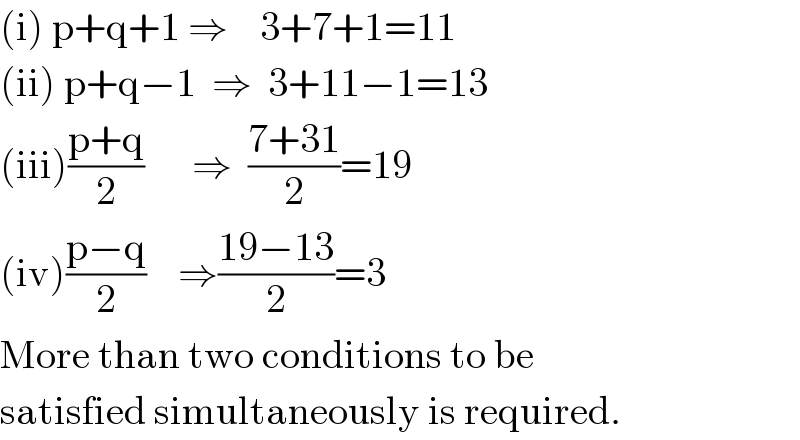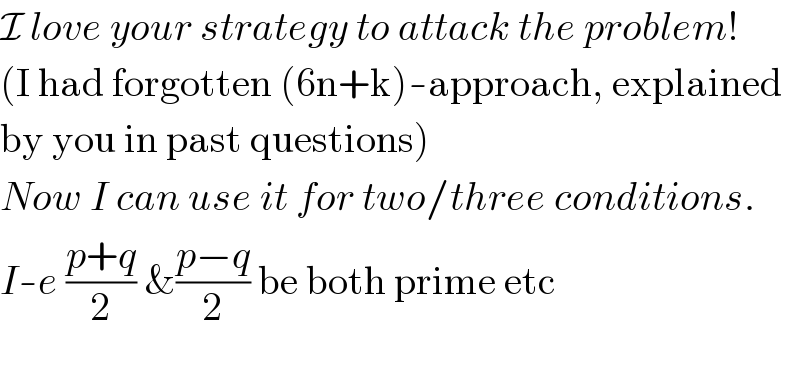
Question Number 17272 by RasheedSoomro last updated on 03/Jul/17

$$\mathrm{Determine}\:\mathrm{two}\:\mathrm{distinct}\:\mathrm{primes}\:\:\:\mathrm{p}\:\:\:\mathrm{and}\:\:\:\mathrm{q}\: \\ $$$$\mathrm{such}\:\mathrm{that}: \\ $$$$\left(\mathrm{i}\right)\:\mathrm{p}+\mathrm{q}+\mathrm{1},\mathrm{p}+\mathrm{q}−\mathrm{1},\frac{\mathrm{p}+\mathrm{q}}{\mathrm{2}}\:\in\:\mathbb{P}\:\left(\mathrm{All}\:\mathrm{primes}\right)? \\ $$$$\left(\mathrm{ii}\right)\:\mathrm{p}+\mathrm{q}+\mathrm{1},\mathrm{p}+\mathrm{q}−\mathrm{1},\frac{\mathrm{p}+\mathrm{q}}{\mathrm{2}},\frac{\mathrm{p}−\mathrm{q}}{\mathrm{2}}\:\in\:\mathbb{P}\:\left(\mathrm{All}\:\mathrm{primes}\right)? \\ $$
Commented by prakash jain last updated on 03/Jul/17

$$\mathrm{p}+\mathrm{q}+\mathrm{1}\:\mathrm{is}\:\mathrm{prime}. \\ $$$$\mathrm{If}\:{p}\:\mathrm{is}\:\mathrm{6}{n}+\mathrm{1},\:{q}\:{canot}\:{be}\:\mathrm{6}{m}+\mathrm{1} \\ $$$$\mathrm{since}\:{p}+{q}+\mathrm{1}=\mathrm{6}\left({n}+{m}\right)+\mathrm{3}\:\notin\mathbb{P} \\ $$$${p}=\mathrm{6}{n}+\mathrm{1} \\ $$$${q}=\mathrm{6}{m}−\mathrm{1} \\ $$$${p}+{q}−\mathrm{1}=\mathrm{6}\left({n}+{m}\right)−\mathrm{1}\:\mathrm{possibly}\:\mathrm{a}\:\mathrm{prime}. \\ $$$$\frac{{p}+{q}}{\mathrm{2}}\:\mathrm{is}\:\mathrm{a}\:\mathrm{prime}=\mathrm{3}\left({n}+{m}\right)\:\mathrm{is}\:\mathrm{prime} \\ $$$$\mathrm{not}\:\mathrm{possible}. \\ $$$$\mathrm{so}\:\mathrm{at}\:\mathrm{least}\:\mathrm{one}\:\mathrm{of}\:{p}\:\mathrm{amd}\:{q}\:\mathrm{is}\:\mathrm{3} \\ $$$$\Rightarrow{q}=\mathrm{3} \\ $$$$\mathrm{now}\:\mathrm{we}\:\mathrm{need}\:\mathrm{to}\:\mathrm{find}\:\mathrm{a}\:\mathrm{prime}\:{p} \\ $$$$\mathrm{4}+{p}\:\mathrm{is}\:\mathrm{prime} \\ $$$$\mathrm{2}+{p}\:\mathrm{is}\:\mathrm{prime} \\ $$$$\frac{\mathrm{3}+{p}}{\mathrm{2}}\:\mathrm{is}\:\mathrm{prime}. \\ $$$$\frac{{p}−\mathrm{3}}{\mathrm{2}}\:\mathrm{is}\:\mathrm{prime}. \\ $$$${p}=\mathrm{6}{n}−\mathrm{1},{p}+\mathrm{4}=\mathrm{6}{n}+\mathrm{3}\:\mathrm{not}\:\mathrm{a}\:\mathrm{prime}. \\ $$$${p}=\mathrm{6}{n}+\mathrm{1},{p}+\mathrm{2}=\mathrm{6}{n}+\mathrm{3}\:\mathrm{not}\:\mathrm{a}\:\mathrm{prime}. \\ $$$$\mathrm{There}\:\mathrm{are}\:\mathrm{no}\:\mathrm{2}\:\mathrm{prime}\:{p}\:\mathrm{and}\:{q} \\ $$$$\mathrm{which}\:\mathrm{satisfy}\:\mathrm{the}\:\mathrm{given}\:\mathrm{four} \\ $$$$\mathrm{conditions}. \\ $$$$\mathrm{Please}\:\mathrm{review}. \\ $$
Commented by RasheedSoomro last updated on 03/Jul/17

$$\left(\mathrm{i}\right)\:\mathrm{p}+\mathrm{q}+\mathrm{1}\:\Rightarrow\:\:\:\:\mathrm{3}+\mathrm{7}+\mathrm{1}=\mathrm{11} \\ $$$$\left(\mathrm{ii}\right)\:\mathrm{p}+\mathrm{q}−\mathrm{1}\:\:\Rightarrow\:\:\mathrm{3}+\mathrm{11}−\mathrm{1}=\mathrm{13} \\ $$$$\left(\mathrm{iii}\right)\frac{\mathrm{p}+\mathrm{q}}{\mathrm{2}}\:\:\:\:\:\:\Rightarrow\:\:\frac{\mathrm{7}+\mathrm{31}}{\mathrm{2}}=\mathrm{19} \\ $$$$\left(\mathrm{iv}\right)\frac{\mathrm{p}−\mathrm{q}}{\mathrm{2}}\:\:\:\:\Rightarrow\frac{\mathrm{19}−\mathrm{13}}{\mathrm{2}}=\mathrm{3} \\ $$$$\mathrm{More}\:\mathrm{than}\:\mathrm{two}\:\mathrm{conditions}\:\mathrm{to}\:\mathrm{be}\: \\ $$$$\mathrm{satisfied}\:\mathrm{simultaneously}\:\mathrm{is}\:\mathrm{required}. \\ $$
Commented by RasheedSoomro last updated on 04/Jul/17

$$\mathrm{Lot}\:\mathrm{of}\:\mathrm{thanks}\:\mathrm{for}\:\mathrm{my}\:\mathrm{math}-\mathrm{guru}! \\ $$
Commented by RasheedSoomro last updated on 04/Jul/17

$$\mathcal{I}\:{love}\:{your}\:{strategy}\:{to}\:{attack}\:{the}\:{problem}! \\ $$$$\left(\mathrm{I}\:\mathrm{had}\:\mathrm{forgotten}\:\left(\mathrm{6n}+\mathrm{k}\right)-\mathrm{approach},\:\mathrm{explained}\right. \\ $$$$\left.\mathrm{by}\:\mathrm{you}\:\mathrm{in}\:\mathrm{past}\:\mathrm{questions}\right) \\ $$$${Now}\:{I}\:{can}\:{use}\:{it}\:{for}\:{two}/{three}\:{conditions}. \\ $$$${I}-{e}\:\frac{{p}+{q}}{\mathrm{2}}\:\&\frac{{p}−{q}}{\mathrm{2}}\:\mathrm{be}\:\mathrm{both}\:\mathrm{prime}\:\mathrm{etc} \\ $$$$ \\ $$
Commented by prakash jain last updated on 05/Jul/17

$$\mathrm{For}\:\left(\mathrm{i}\right)\:\mathrm{three}\:\mathrm{conditons} \\ $$$$\mathrm{p}+\mathrm{q}+\mathrm{1}\:\mathrm{prime} \\ $$$$\mathrm{p}+\mathrm{q}−\mathrm{1}\:\mathrm{prime} \\ $$$$\frac{\mathrm{p}+\mathrm{q}}{\mathrm{2}}\:\mathrm{prime} \\ $$$$\mathrm{case}\:\mathrm{p}=\mathrm{6m}+\mathrm{1},\mathrm{q}=\mathrm{6n}−\mathrm{1} \\ $$$$\mathrm{p}+\mathrm{q}+\mathrm{1}\:\mathrm{not}\:\mathrm{possible} \\ $$$$\mathrm{case}\:\mathrm{p}=\mathrm{6m}+\mathrm{1},\mathrm{q}=\mathrm{6n}+\mathrm{1} \\ $$$$\frac{\mathrm{p}+\mathrm{q}}{\mathrm{2}}\:\mathrm{not}\:\mathrm{possible} \\ $$$$\mathrm{so}\:\mathrm{one}\:\mathrm{of}\:\mathrm{p}\:\mathrm{and}\:\mathrm{q}\:\mathrm{is}\:\mathrm{either}\:\mathrm{2}\:\mathrm{or}\:\mathrm{3}. \\ $$$$\mathrm{2}\:\mathrm{is}\:\mathrm{ruled}\:\mathrm{out}\:\mathrm{since}\:\mathrm{there}\:\mathrm{is}\:\mathrm{only} \\ $$$$\mathrm{one}\:\mathrm{even}\:\mathrm{prime}\:\mathrm{we}\:\mathrm{need}\:\mathrm{sum}\:\mathrm{of} \\ $$$$\mathrm{of}\:\mathrm{two}\:\mathrm{distinct}\:\mathrm{primes}\:\mathrm{to}\:\mathrm{be}\:\mathrm{even}. \\ $$$$\mathrm{p}=\mathrm{3},{q}=\mathrm{6}{n}+\mathrm{1} \\ $$$${p}+{q}+\mathrm{1}=\mathrm{6}{n}+\mathrm{4}\notin\mathbb{P} \\ $$$$\mathrm{p}=\mathrm{3}\:,\mathrm{q}=\mathrm{6n}−\mathrm{1} \\ $$$${p}+{q}−\mathrm{1}=\mathrm{6}{n}+\mathrm{2}\notin\mathbb{P} \\ $$$${p}={q}=\mathrm{2}\:\mathrm{is}\:\mathrm{only}\:\mathrm{option}. \\ $$
